Pentathlon Personalities: Kerenza Bryson, Doctor Do-It-All
Contrary to assumptions, Kerenza Bryson can actually switch off. In fact, like most things in her life, she does it pretty damn well.
After a season that defied even her wildest expectations, the World No.3 from Great Britain has just relocated to Pentathlon GB’s training base in Bath. But before the big move she spent a few weeks getting away from it all in the Maldives and Greece.
‘Getting away from it all’ somewhat underplays Bryson’s life however. Put simply: there is quite a bit to get away from, more than most other 25-year-olds on the planet. Elite athlete, army officer, qualified doctor. Bryson broke out in a prolific 2023 season while being all of these things all at the same time. Now she is also within touching distance of adding another title to that list, one she has dreamt of for almost two decades: Olympian. Understandably, winding down from all of that takes time.
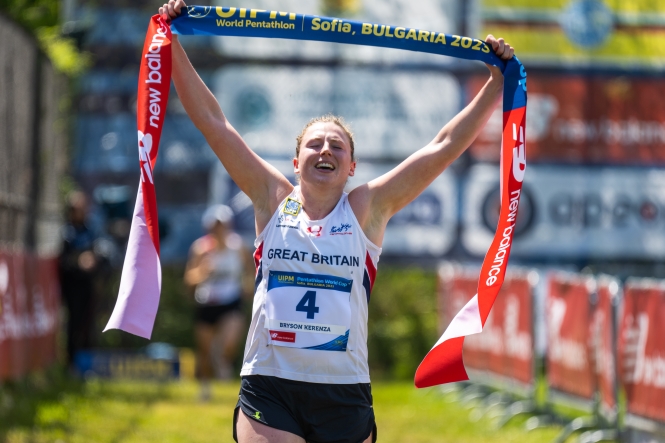
“I think it’s really important to switch off — properly switch off,” Bryson tells UIPM. “I mean, I take my Garmin off! A lot of athletes describe their Garmin as another limb. It’s part of the body because we rely on it for all of our stats and data for training. But I take switching off seriously. I’m quite strict. The first two weeks of not having those stresses at the end of the season are so important.”
With the Garmin removed from her wrist, Bryson felt enough of a weight lifted to kick back and reflect on all that the previous nine months had brought her. In eight senior competitions in 2023 her record read 2-5-1-1-6-6-5-3 as she made the extended podium at every event she entered. The two victories came in the space of 24 hours in Sofia including a breakthrough first individual UIPM Pentathlon World Cup gold medal. Her final result of the season was arguably more consequential, a UIPM Pentathlon World Championships bronze on home soil and with it a quota qualification spot for next summer’s Olympics in Paris.
“It’s been a big year for me,” she says with a smile. “I graduated and qualified for the Games which initially wasn’t one of my goals. I and the performance team didn’t think I was going to be able to qualify this year. It was more about trying to push for qualifying next year. To be able to do that this year and have that in the bag is a really nice bonus. It’s been much better than I could have asked for.”
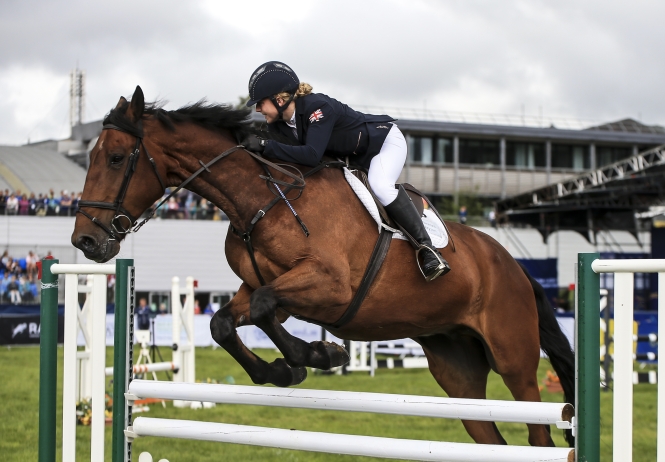
One of the most pleasing aspects for Bryson is how steady her success was, in a sport which is notoriously difficult to find consistency. That the most prolific season of her career came in the final year of her medicine degree, while still balancing military duties as a reserve officer in the Royal Logistics Corps, is only more remarkable. Her secret? Finding a routine amid the chaos of living three lives at once.
“I’m a pretty motivated, resilient person and I’ve known since I was a kid that my goal was to be an Olympian,” says Bryson. “This lifestyle of fitting stuff around goes back a long way, to when I first started sport really. The skill is mastering how to take off hats and put other hats on within minutes. I think I’ve got quite good with my three hats of medicine, army and sport, of finishing my day of hospital placement, taking off that hat and saying ‘right I”m in sport head now’ and completely going into that mindset. I’m quite good at switching between them.”
Bryson laughs when it’s suggested that Pentathlon, with its mix of headwear for each discipline, was always going to be the perfect sport for her, then? "We have to take them all on and off really quickly now with the new format!” she responds.
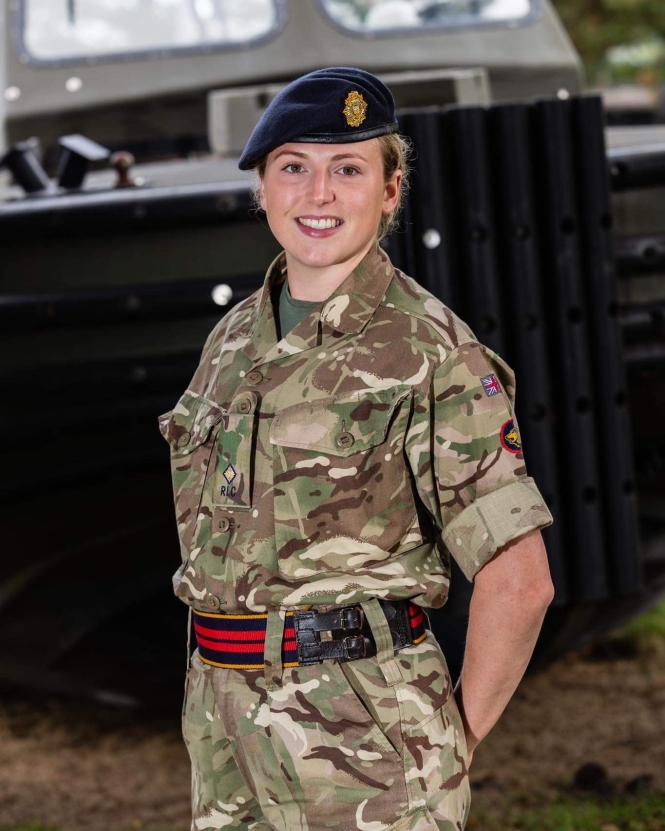 |
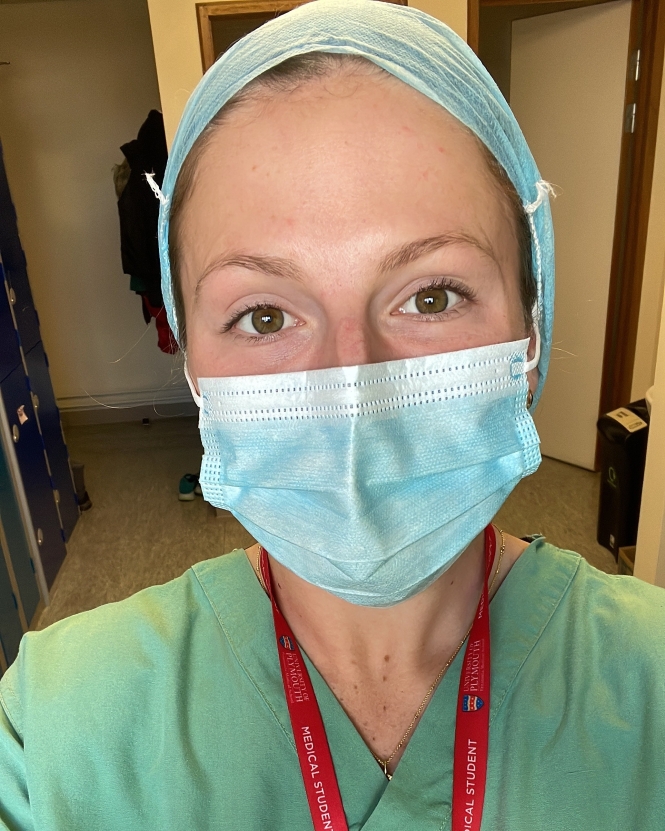 |
Her pentathlon journey is down to a lot more than hats, of course. The first steps were on horseback, ponyback to be precise. Bryson’s mother Debbie is a riding instructor and runs a livery yard. “I grew up riding before I could run,” says Bryson who moved into tetrathlons aged 7 or 8 before a fateful meeting with a real-life Olympian firmed up her career path.
“When I was 10 or 11, Heather Fell came and did a pony club demonstration evening. She brought along all of her fencing kit and asked did anyone want to try it on. I put my hand up and got to put on all of her Olympic kit and hold her blades. I was quite young and diddy so it was quite funny with my little head rattling around in this huge mask but that was, for me, that kind of inspirational moment where I thought ‘oh, this is really cool, maybe I could do this!’”
Fell, an Olympic silver medalist from the Beijing Games, was understandably inspirational. Bryson soon won a scholarship at Plymouth Academy where she was part of their pentathlon programme alongside Myles Pillage, currently No.18 in the UIPM men’s world rankings. Four years later Bryson was there in the flesh as a spectator at London 2012 and her Olympic obsession grew further. That’s what made having her mother, father Phil, sister Tallulah and a squad of other loved ones there in person 11 years later to see her secure that precious quota place in Paris when she won bronze in Bath in August an instant career highlight.
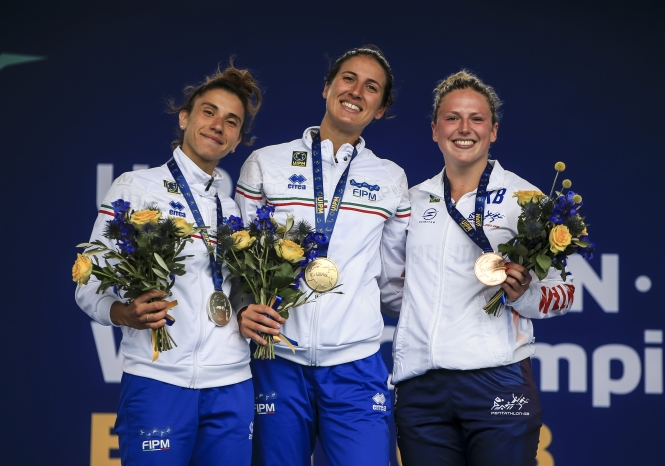
“It was way more emotional than I thought it would be,” Bryson admits. “I thought it would just be really cool but it was actually a really special thing that I don’t think I’ll ever forget. Having all of my family there, my boyfriend and his family, friends and a whole Team Bryson there, for that then to be the event that I qualified for the Games, made it more special.”
Great Britain’s strength in depth, particularly on the women’s side, means that Paris isn’t yet 100 per cent assured, of course. But for now she’s done her bit and Team Bryson is being proactive and planning for what they hope will be an Olympic debut at the Palace of Versailles next summer.
Bryson has targets and things she wants to tweak. Relocating to Bath in mid-October, having previously been a satellite athlete due to med school and military commitments, is already reaping rewards. For a start, she’s getting more sleep.
“It’s really awesome, because everything is set up perfectly for me here,” she says. “When I was at home organising it around my medical stuff or my army stuff, I’ve had to squish things in here and there, sort out my own coaching, sometimes write my own sessions. Here, you just turn up. And that’s really nice because it gives you more time to focus on the other things that we can do, like recovery and performance.
It’s also brought her even closer to her teammates, a boon for both being driven on but staying grounded at the same time. “We literally see, train, eat with each other every day. Everyone is amazing, especially with the girls squad at the moment. We’re really high performing and we’re pushing each other on all the time. But then we are all genuinely friends as well. Team GB, whatever sport it is, there’s always a good level of morale and spirit.”
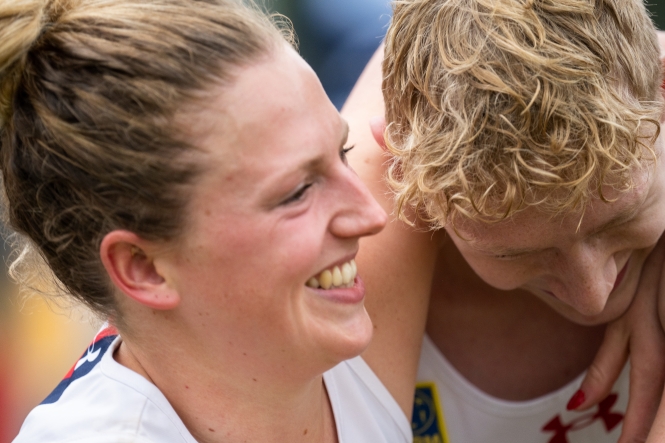
With four Great British women in the top 21 of the UIPM world rankings, a race-off for the maximum of two places in Paris could well transpire. But Bryson isn’t naturally one to sweat the uncontrollables. While it may feel like cliché to suggest it, she readily admits that her experiences becoming a doctor, she qualified the same week she won that breakthrough gold in Bulgaria, has given her all of the perspective she couldn’t possibly need.
“I’m someone who is quite good at dealing with stress and competing and part of that is due to the perspective I have on sport,” says Bryson, who is particularly grateful to her National Health Service deanery for giving her a rare year off before she moves on to continuing her career as a junior doctor, perhaps in trauma and acute medicine given she is self-admittedly “drawn to the chaos”.
“The fact that one day I would go from seeing someone in a horrific road traffic accident or a really sad situation in obstetrics if something goes wrong with a birth, then the next day I am competing, it really makes you realize that not doing well in a competition isn’t the worst thing in the world. I’m really lucky to be in a situation where I am being paid to be a full-time athlete, doing what I love with my friends.”
By Joe Callaghan



